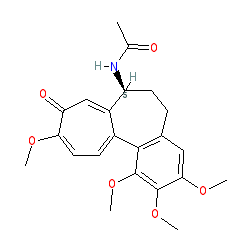GtoPdb is requesting financial support from commercial users. Please see our sustainability page for more information.
|
Synonyms: Colcrys® | methoxylated analogue of XD1 | XD25
colchicine is an approved drug (FDA (2009))
Compound class:
Synthetic organic
Comment: Colchicine is a microtubule inhibitor. It is a methoxylated analogue of XD1 (colchicein).
SARS-CoV-2 and COVID-19: There are a number of clinical trials looking at the efficacy of colchicine as a therapy to help treat, and/or prevent the development of, severe symptoms in COVID-19 patients [7]. It has been included in an arm of the UK's RECOVERY trial. Click here to see al clochicine studies on ClinicalTrials.gov [9,11]. Colchicine is predicted to target inflammation and systemic clotting abnormalities that accompany COVID-19 [8,10-11]. This repositioning of colchicine is based both on the drug's established anti-inflammatory action, on its ability to inhibit NLRP3 inflammasome activation, and on experimental evidence that colchicine-induced neutrophil depletion inhibits the release of the endogenous antimicrobial peptide α-defensin-1 (DEFα-1; DEFA1) and reduces thrombus formation in experimental models [2]. Background: contact factors (such as kallikrein and FXIIa) connect inflammation to the activation of coagulation, via promoting the production of DEFα-1 by activated neutrophils. DEFα-1 has pro-thrombotic activity, acting to both stabilise fibrin and thrombus formation and impeding clot resolution by reducing fibrinolysis [2]. In early 2021, preliminary data from the Phase 3 ColCORONA study (NCT04322682) provided some evidence that colchicine reduced hospitalisation (by 25%), progression to mechanical ventilation (by 50%) or death (by 44%) in >4100 confirmed COVID-19 patients, compared to placebo. The drug was given in an outpatient setting. A medRxiv preprint providing more details from the ColCORONA study was posted on 27th January 2021 (DOI: 10.1101/2021.01.26.21250494v1) prior to the peer review process being completed. In contrast a preprint of results from the colchicine arm of the RECOVERY trial (11340 hospitalised COVID-19 patients) reported no clinical benefit compared to standard care by any of the primary or secondary outcome measures (Horby et al., 2021; medRxiv https://doi.org/10.1101/2021.05.18.21257267). Ligand Activity Visualisation ChartsThese are box plot that provide a unique visualisation, summarising all the activity data for a ligand taken from ChEMBL and GtoPdb across multiple targets and species. Click on a plot to see the median, interquartile range, low and high data points. A value of zero indicates that no data are available. A separate chart is created for each target, and where possible the algorithm tries to merge ChEMBL and GtoPdb targets by matching them on name and UniProt accession, for each available species. However, please note that inconsistency in naming of targets may lead to data for the same target being reported across multiple charts. ✖
View more information in the IUPHAR Pharmacology Education Project: colchicine |
|
|||||||||||||||||||||||||||||||||||
| No information available. |
Summary of Clinical Use  |
| Colchicine is an oral drug that is primarily used to treat gout. It can also be used to treat autoinflammatory conditions such as Behcet's syndrome. Colchicine was approved for use in combination with probenecid as early as 1961. Full US FDA approval was only granted for the single ingredient drug in 2009, although it had been marketed prior to this date without formal approval. In June 2023, the FDA approved the use of colchicine as an anti-inflammatory atheroprotective cardiovascular treatment. In this setting colchicine is expected to reduce the risk of myocardial infarction, stroke, coronary revascularization, and cardiovascular death in patients with established atherosclerotic disease or at high risk of developing cardiovascular disease. |
| Clinical Trials | |||||
| Clinical Trial ID | Title | Type | Source | Comment | References |
| NCT04472611 | Colchicine/Statins for the Prevention of COVID-19 Complications (COLSTAT) Trial | Phase 3 Interventional | Yale University | ||
| NCT04416334 | PREEMPTIVE THERAPY WITH COLCHICINE IN PATIENTS OLDER THAN 70 YEARS WITH HIGH RISK OF SEVERE PNEUMONIAE DUE TO CORONAVIRUS | Phase 3 Interventional | Instituto de Investigación Marqués de Valdecilla | ||
| NCT04360980 | The Effects of Standard Protocol With or Without Colchicine in Covid-19 Infection | Phase 2 Interventional | Shahid Beheshti University of Medical Sciences | ||
| NCT04322682 | Colchicine Coronavirus SARS-CoV2 Trial (COLCORONA) | Phase 3 Interventional | Montreal Heart Institute | ||
| NCT04328480 | The ECLA PHRI COLCOVID Trial. Effects of Colchicine on Moderate/High-risk Hospitalized COVID-19 Patients. | Phase 3 Interventional | Estudios Clínicos Latino América | ||
| NCT04326790 | The GReek Study in the Effects of Colchicine in Covid-19 cOmplications Prevention | Phase 2 Interventional | National and Kapodistrian University of Athens | ||
| NCT04322565 | Colchicine Counteracting Inflammation in COVID-19 Pneumonia | Phase 2 Interventional | Azienda Ospedaliero-Universitaria di Parma | ||









